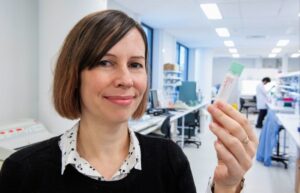
Flinders University research will be boosted by more than $5.9 million for two medical research projects as part of the 2022 National Critical Research Infrastructure Initiative, funded by the Federal Government.
A $2.9 million grant for ‘AutoMedic: A scalable, smart solution to detect and resolve medicine harm’ was secured by Associate Professor Niranjan Bidargaddi, from the College of Medicine and Public Health.

This project will develop and trial for national rollout an innovative, automated medicine risk review program (AutoMedic), which uses artificial intelligence to precisely detect potential issues with medicine regimens, which pharmacists would then review and resolve.
The trial will provide a useful model for a “smart, scalable solution to detect and resolve medicine harm,” says chief investigator, Associate Professor Bidargaddi.
Another $2.9 million project – ‘In SCOPE (Surveilance for Col0rectal Cancer Prevention): Digital solutions to optimise colonoscopy surveillance’ – was secured by Associate Professor Erin Symonds, from the College of Medicine and Public Health.
This project will develop, validate and implement a digital intervention surveillance program to manage the growing demand for colonoscopies, while establishing a data registry for future cancer research.

“The grant will enable us to integrate our proven framework of our existing Southern Adelaide colonoscopy program (SCOOP) with digital eHealth processes to provide a new coordinated program to manage surveillance colonoscopies,” says Chief Investigator, Associate Professor Symonds.
“This will be implemented across five different hospital networks in South Australia to determine feasibility, suitability and cost-effectiveness of the program.”
These grants are part of a $73 million investment by the Federal Government for 19 projects to develop and implement new medical technologies, or to build or upgrade facilities for cutting-edge health and medical research.
The Hon Mark Butler MP, Minister for Health and Aged Care, says the grants will provide critical launchpads for researchers to discover and test better ways to prevent, diagnose and treat serious health conditions.
“To pursue big ideas and find solutions to complex health problems, our researchers need world-class, state-of-the-art facilities, equipment and technology,” says the Minister.
The 19 projects are funded under the National Critical Research Infrastructure Initiative, a 10-year, $650 million Australian Government investment from the Medical Research Future Fund, which funds facilities, equipment, systems and services that support world-class health and medical research.

